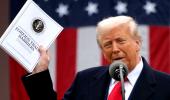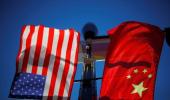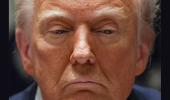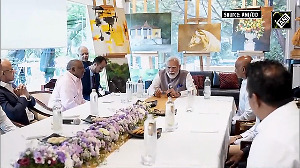After expressing anger over China's retaliation of his 34 per cent tariffs on United States exports, US President Donald Trump appeared to offer an olive branch to Beijing linking the sale of Chinese social media App TikTok to relief on high levies on Chinese exports to America.

After his initial anger over Friday's move by Beijing to slap 34 per cent of tariffs, the same as his tariff on Chinese exports, Trump said China is panicking and at the same time offered a quid pro quo deal to lower tariffs if TikTok is allowed to sell its US stakes to an American buyer.
On Thursday, Trump suggested offering relief on import duties if China aligned with his TikTok plans, the Hong Kong-based South China Morning Post reported from Washington.
Earlier, Trump has extended the deadline to ban TikTok to 75 days linking its sale to a deal with China on tariffs.
'My Administration has been working very hard on a Deal to SAVE TIKTOK, and we have made tremendous progress. The Deal requires more work to ensure all necessary approvals are signed, which is why I am signing an Executive Order to keep TikTok up and running for an additional 75 days,' he said in a post on Truth Social.
Trump further said his administration hoped to 'continue working in Good Faith with China, who I understand are not very happy about our Reciprocal Tariffs (Necessary for Fair and Balanced Trade between China and the U.S.A.!)'
'This proves that Tariffs are the most powerful Economic tool, and very important to our National Security! We do not want TikTok to go dark. We look forward to working with TikTok and China to close the Deal,' he added.
The Chinese social media app, used by 170 million Americans, went dark temporarily after the previous Biden administration banned it but began operations again after Trump temporarily withdrew the ban.
A representative of ByteDance, TikTok's Chinese parent, said in a statement that it had been in 'discussion with the US Government regarding a potential solution for TikTok US', state-run Global Times in Beijing reported.
'An agreement has not been executed. There are key matters to be resolved. Any agreement will be subject to approval under Chinese law,' the statement said, suggesting that any deal needs the Chinese government's approval.
Meanwhile, the Chinese government's position on opposing US abuse of tariffs was released on Saturday.
'Recently, under various pretexts, the United States has imposed tariffs on all trading partners, including China, which severely infringes upon the legitimate rights and interests of nations, severely violates World Trade Organisation rules, severely harms the rules-based multilateral trading system, and severely disrupts the stability of the global economic order. The Chinese government strongly condemns and firmly opposes this,' state-run Xinhua news agency said.
There is no other comment on Trump's proposal in Beijing as China is currently on a holiday to observe Qingming Festival, also known as Tomb-Sweeping Day during which Chinese pay their tributes to ancestors.
On March 27, when asked to comment on reports on Trump's offer, Chinese Foreign Ministry spokesperson Guo Jiakun stated that when it comes to actions such as the operation and acquisition of businesses, 'we believe they should be independently decided by companies in accordance with market principles'.
If it involves Chinese companies, China's laws and regulations should be observed, Guo noted.
Trump's proposal for a deal came amid mounting concerns among the US over Beijing's tariffs as China imports the largest agricultural produce amounting to about USD 30 billion from the US.
Reports from the US say Trump's tariffs have raised concerns and unrest among American farmers who vastly depend on bulk exports of their produce to China.
Significantly, Beijing also announced immediate export control measures on certain rare earth-related items over which it has a near monopoly, which will have a bearing on US defence industries.
China's Ministry of Commerce and General Administration of Customs said export control measures on certain items relate to seven types of medium and heavy rare earths.
The measures, effective immediately, aim to better safeguard national security and interests and fulfil non-proliferation and other international obligations, the spokesperson said on Friday.
Rare earth elements, a group of 17 metals, are used in defence technologies, including missiles, lasers, vehicle-mounted systems such as tanks, and military communications.
Commenting on US, China tariffs, Tu Xinquan, dean of the China Institute for WTO Studies at the University of International Business and Economics in Beijing, said that such rapid, intensive and multi-pronged countermeasures are unprecedented in the world's history, proving that China will not sit back amid unilateral bullying tariffs.
"This isn't just tit-for-tat. These countermeasures, including both tariff and non-tariff measures, aim to directly hit the weak spots of the US to make it feel the real pain," Tu told state-run China Daily.
Bai Ming, a researcher at the Chinese Academy of International Trade and Economic Cooperation, said that China, as the world's second-largest economy, has taken the lead in resisting US trade protectionism.
"These countermeasures are not only to protect China's own interests, but also to safeguard the stable operation of the global trading system," he emphasised.











 © 2025
© 2025